|
|
|
Sort Order |
|
|
|
Items / Page
|
|
|
|
|
|
|
| Srl | Item |
| 1 |
ID:
151544
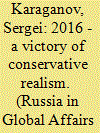

|
|
|
|
|
| Summary/Abstract |
In the winter of 2014, two months before the events in Crimea, when it was already clear that the confrontation with the West was getting increasingly tense, I read again Leo Tolstoy's War and Peace. I was struck by a phrase that had not caught my attention before: "A battle is won by those who firmly resolve to win it." I realized then that Russia would resolve and win.
|
|
|
|
|
|
|
|
|
|
|
|
|
|
|
|
| 2 |
ID:
138340
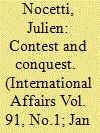

|
|
|
|
|
| Summary/Abstract |
For more than a decade, Russia's foreign policy has sought to challenge the international consensus on a number of issues. Today, as the international internet ecosystem is becoming more volatile, Moscow is eager to shift the western narrative over the current global internet governance regime, in which the United States retains considerable leverage. In a context wherein states increasingly forge links between cyberspace and foreign policy, this article explores Russia's deepening involvement in internet governance. The disclosure by Edward Snowden of the US government's wide net of online surveillance contributed to legitimize the Russian approach to controlling online activity. While the struggle around the narrative of internet governance has been heating up since then, Russia actively seeks to coordinate internet governance and cyber security policies with like-minded states in both regional forums and the United Nations. By introducing security concerns and advocating more hierarchy and a greater role for governments, Moscow is contributing to the politicization of global cyber issues and seeking to reshape the network in accordance with its own domestic political interests. Indeed, the Russian leadership has come to consider the foreign policy of the internet as the establishment of a new US-led hegemonic framework that Washington would use to subvert other sovereign states with its own world views and values.
|
|
|
|
|
|
|
|
|
|
|
|
|
|
|
|
| 3 |
ID:
132702
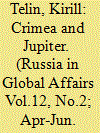

|
|
|
|
|
| Publication |
2014.
|
| Summary/Abstract |
The use of force is no longer legitimate like it was in the 19th and 20th centuries. Conservative-style action from the position of force cannot achieve anything in terms of boosting a country's position even within the traditional zone of influence.
|
|
|
|
|
|
|
|
|
|
|
|
|
|
|
|
| 4 |
ID:
132710
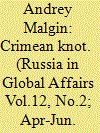

|
|
|
|
|
| Publication |
2014.
|
| Summary/Abstract |
Russia will have to deal with the effects of Crimea being part of an independent Ukraine for 23 years. A Crimean political and business elite has emerged with its own values, bonds, and relationships. Russia is not the motherland of an entire generation of Russian-speaking youth, but the motherland of their ancestors.
|
|
|
|
|
|
|
|
|
|
|
|
|
|
|
|
| 5 |
ID:
132698
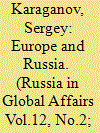

|
|
|
|
|
| Publication |
2014.
|
| Summary/Abstract |
Debates over the ongoing crisis in relations between Russia and the West revolve around the incorporation of Crimea, the global reaction to that move, and the future configuration of the Ukrainian state if, of course, it manages to survive (and I hope it will). But I contend that these are not the primary issues in global terms. There are other crucial questions. The first is what the European security system will be like. I repeat: the Old World was not allowed to withdraw from the Cold War, and now it may see a new round of tension. The second important question is whether Russia will be able to overcome the impasse in its development, in which it found itself after it restored statehood at the end of the 2000s. The third and closely linked question is whether Russia will wish to remain part - even an independent and very special partner - of Europe or will it opt for cultural-civilizational isolation and increasingly lean towards the East economically. It is obvious that Russia is firmly determined to change the rules of the game that have been dictated to it for the past twenty-five years. Unable and reluctant to toe the line, Russia has given up attempts to become part of the West.
|
|
|
|
|
|
|
|
|
|
|
|
|
|
|
|
| 6 |
ID:
151546


|
|
|
|
|
| Summary/Abstract |
An informal remark by Russian Foreign Minister Sergei Lavrov made last year that there can be no "business as usual" with the West any more is a belated statement of fact. It reflects only one aspect of the fundamental transformations taking place in the world. Naturally, Russia's foreign policy cannot but respond to these changes, not just ad hoc but doctrinally.
|
|
|
|
|
|
|
|
|
|
|
|
|
|
|
|
| 7 |
ID:
147725


|
|
|
|
|
| Summary/Abstract |
Any serious discussion of the Russian foreign policy inevitably begins with a question about developments and trends in the world as a whole. These days, virtually every work on Russia's foreign policy is predicated on the notion that there is a systemic crisis of the liberal world order. For some, this crisis is a tragedy of historical scale; for others, it is a long-awaited confirmation of old prophecies; and for still others, an unexpected gif. Whatever diagnostic methods used, the principal symptoms of the crisis are as follows.
|
|
|
|
|
|
|
|
|
|
|
|
|
|
|
|
| 8 |
ID:
112810


|
|
|
|
|
| Publication |
2012.
|
| Summary/Abstract |
Sergei Ryabkov: As for the retrospective, I believe that there are not very many regions in the world, if any, far away from our borders where there would be so many people sympathizing with Russia. People who either have studied in our country or are in some way or other linked to our country. People sharing the ideals that we as a country upheld in the past, those who saw Russia (USSR) as a symbol of social justice and movement toward a better future. Generally speaking, that is a unique set of circumstances that, in my opinion, still have a positive impact on Russia's relations with the Latin American region and the prospects for our ties.
|
|
|
|
|
|
|
|
|
|
|
|
|
|
|
|
| 9 |
ID:
127422
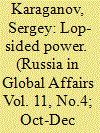

|
|
|
|
|
| Publication |
2013.
|
| Summary/Abstract |
The main reserves for Russia's foreign policy and its influence in the next decade lie more than ever in internal development. And this is also where the main threats are, fraught with the risk of losing political weight in the international arena and the status of great power.
|
|
|
|
|
|
|
|
|
|
|
|
|
|
|
|
| 10 |
ID:
132699
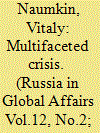

|
|
|
|
|
| Publication |
2014.
|
| Summary/Abstract |
The impact of the Ukrainian crisis on the existing world order proves to be so manifold that it is hard to predict its consequences, irrespective of its outcome. This short article touches upon only a few aspects of the problem.
|
|
|
|
|
|
|
|
|
|
|
|
|
|
|
|
| 11 |
ID:
088149


|
|
|
|
|
| Publication |
2009.
|
| Summary/Abstract |
NATIONAL ARCHETYPES PLAY AN IMPORTANT ROLE in foreign policies of all countries; in case of Russia it is the historical traditions Muscovy inherited from Byzantium that determined, and still determine, the general development trends of the Russian statehood. The Byzantine heritage manifested in the idea of "Moscow the Third Rome," determined, to a great extent, Russia's mission in the world. Realized in foreign policy it produced amazing results: a vast state that gathered Russians and Orthodox Christians together with other ethnic groups and religions under the wing of the Russian and Soviet empires. However every time the Great Russia idea was rejected-in the early and late 20th century - the Russian statehood collapsed resulting in "a major geopolitical disaster of the century
|
|
|
|
|
|
|
|
|
|
|
|
|
|
|
|
| 12 |
ID:
132715
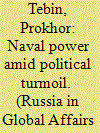

|
|
|
|
|
| Publication |
2014.
|
| Summary/Abstract |
The World Ocean is a key space for international relations and military policies of the great powers. It depends only on Russia whether it becomes an active player in this space or a passive observer. Naval power in the 21st century will probably play a greater role in foreign policies of maritime nations than in the 20th century. The 70/80/90 rule from the present U.S. naval strategy has already entered into wide use. This rule means that 70 percent of the Earth's surface is covered with seas and oceans, 80 percent of people live along coasts, and 90 percent of all world goods travel on the ocean. The world ocean is a source of an increasing number of conflicts and threats to international, regional and national security. Symbolically, the Ukrainian crisis, the most serious challenge for Russia's foreign policy in recent years, is directly related to the naval power issue. This article discusses in this context the strategic situation in the world ocean, relations among maritime nations, and some aspects of Russia's naval activities in the medium and long term.
|
|
|
|
|
|
|
|
|
|
|
|
|
|
|
|
| 13 |
ID:
132697
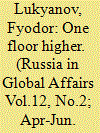

|
|
|
|
|
| Publication |
2014.
|
| Summary/Abstract |
It is already becoming habitual: yet another turn in world politics - and a fondly prepared portfolio of materials has to be shelved, and new ones made in an emergency mode. Witnessing epoch-making events is fascinating, but it takes a lot of nerve…
The period from February to April 2014 marked the sharpest turn in history since the end of the Cold War. We have witnessed the actual collapse of the Ukrainian statehood which emerged after the abolition of the Soviet Union, Crimea's entry into the Russian Federation, and an upsurge in confrontation between Moscow and the West. No wonder life made us revise our plans and devote the entire issue of Russia in Global Affairs to the changes which someone has already dubbed "Russian spring."
|
|
|
|
|
|
|
|
|
|
|
|
|
|
|
|
| 14 |
ID:
162811
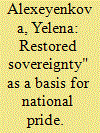

|
|
|
|
|
| Summary/Abstract |
The royal authorities of the Restoration period referred to such sovereignty as essentially unlimited power to do whatever is required to ensure national security disregarding the constitutional order that appeared to preclude it."
|
|
|
|
|
|
|
|
|
|
|
|
|
|
|
|
| 15 |
ID:
125023
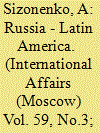

|
|
|
|
|
| Publication |
2013.
|
| Summary/Abstract |
THERE ARE CLEAR SIGNS of revival in relations between Russia and Latin American countries seen in rapidly increasing political contacts through meetings and summits,* the growing trade and the range of products in the region's economy, new Russian investments, and expanding cultural and academic ties. And this is in sharp contrast to the 1990s when Latin America ended up in the fringes of Russia's foreign policy. The situation is different now when this region has firmly become a part of Russian Federation's international relations. They are based above all on the variety of contacts in different formats between the two states and their mutual desire to achieve domestic prosperity.
|
|
|
|
|
|
|
|
|
|
|
|
|
|
|
|
| 16 |
ID:
132704
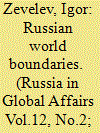

|
|
|
|
|
| Publication |
2014.
|
| Summary/Abstract |
Until spring 2014, discussions about the new Russian national identity, including the Russian world concept, had little to do with Russia's foreign policy and national security agenda. The revolution in Ukraine made it one of the issues critical for the survival of the Russian nation and statehood.
|
|
|
|
|
|
|
|
|
|
|
|
|
|
|
|
| 17 |
ID:
117358


|
|
|
|
|
| Publication |
2012.
|
| Summary/Abstract |
President of the Russian Federation
COLLEAGUES,
As you know, today, Russia is observing a national day of mourning for those killed in the south of our country and in the road accident in Ukraine. This is a great tragedy, a great misfortune. I ask you to stand and honor the victims' memory with a minute of silence.
(Minute of silence.)
Thank you.
Colleagues,
I greet today the senior members of Russia's diplomatic service. Our first meeting took place in 2002, when we celebrated the Foreign Ministry's 200th anniversary. The decade that has passed since then has shown how useful and needed these regular and substantial discussions are. It is you and the people working under you who promote and defend our country's interests abroad on a daily basis, defend Russia's position, and help to increase its influence on the processes taking place in the world.
The diplomatic service's current priorities were set out in the Executive Order On Measures to Implement the Russian Federation Foreign Policy of May 7, this year. The fast-changing situation in international relations makes it more imperative than ever to improve the work of the Foreign Ministry and other agencies involved in this area. What is important now is to provide rapid and professional analysis of events taking place and make timely forecasts. But let me add here that it is not enough to simply be passive observers and "follow developments," as the traditional bureaucratic parlance has it. You need to be more active in trying to influence the situation in circumstances when
Speech at a meeting with Russian ambassadors and permanent representatives to international organizations on July 9, 2012
page 1
Russian interests are directly concerned, preempt developments, and be prepared for all possible turns of events, even the most unfavorable scenarios.
|
|
|
|
|
|
|
|
|
|
|
|
|
|
|
|
| 18 |
ID:
146256
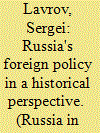

|
|
|
|
|
| Summary/Abstract |
There are different opinions, and doubts too, as to whether Russia assesses the international situation and its position in the world soberly enough. This is an echo of never-ending disputes between pro-Western liberals and the advocates of one's own unique path. There are also people, both inside and outside the country, who believe that Russia is doomed to constantly fall behind and catch up, or adapt to the rules invented by others, and therefore cannot claim a rightful role in international affairs. Let me offer some thoughts on these issues, recalling facts from history and drawing historical parallels.
|
|
|
|
|
|
|
|
|
|
|
|
|
|
|
|
| 19 |
ID:
127416


|
|
|
| 20 |
ID:
125111


|
|
|
|
|
| Publication |
2013.
|
| Summary/Abstract |
THE SHANGHAI Cooperation Organization (SCO) has become one of the leading components of Russia's foreign policy both doctrinally and on the practical level. It is in Russia's long-term interests for the SCO to stand firmly on its feet and move steadily forward in its development, strengthening its reputation as a macro-organization of a new type. Russia's upcoming presidency of the Organization in 2014-2015 imposes an additional obligation on our state to make a proactive and significant contribution to the formulation of SCO strategy.
|
|
|
|
|
|
|
|
|
|
|
|
|
|
|
|
|
|
|
|
|